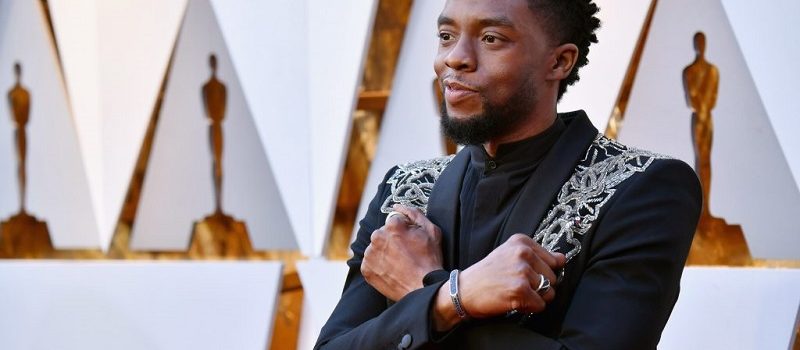The passing of Chadwick Boseman struck me pretty hard. Not one to get all worked up over the loss of a “celebrity,” the man who was Black Panther leaving this earth was different for a myriad of reasons. I needed some hours between breaking news and putting fingers to the laptop to process. This is not merely a sense of loss from someone gone too soon. After all, this writer is someone who has survived an emergency open-heart surgery that only 20-percent survives. Since then, I have become part of several online support groups where the reality of the fragility of life could not be more piercing. Why Boseman’s death, after a four year battle against Colon Cancer, struck a chord is because of who he is, who he has played, and how he carried himself as a role model to countless souls who had previously not had someone like him to look up to.
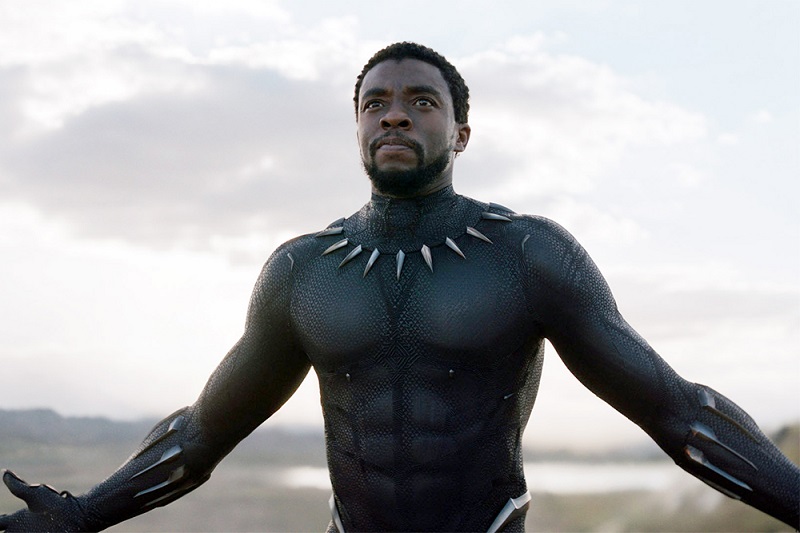
I first saw Boseman in 2010 when I was covering a short-lived show The Glades. But it is his breakout role of Jackie Robinson in 42 in 2013 that showcased a man who showed with his actions that an innate gift alone was not enough. It was my interview with him for that film where I became aware of his supreme commitment to the work it takes to become an artist capable of moving people simply from a performance. As Robinson broke the color barrier in Major League Baseball, he became the target of unconscionable racism, both blatant and subtle. The actor took that responsibility of portraying such a historically important individual seriously, dug deep, and gave the world pure unadulterated inspiration.
Each of us has a role to play in the destroying of systematic racism in America and Boseman felt that bringing Jackie’s story to life was just one part of what he could do in that arena. 42 was not simply a movie or even an important biopic. The Robinson story could be an indelible lesson in going high when they go low, to paraphrase former First Lady Michelle Obama. The Brooklyn Dodgers superstar and future Hall of Famer’s true tale not only removed the curtain on a civil rights trailblazer’s method of conquering hate, but it also served as a blueprint for how fame is a priceless opportunity for the person under that spotlight to impart seismic societal change. Boseman gained some prominence from 42 and immediately put the lessons of Jackie Robinson to work.
One product of the critical and audience response from 42, which also starred Harrison Ford as Branch Rickey (the man who gave Robinson that opportunity), the actor felt he was rewarded for his view that every role he tackles must have meaning beyond entertainment. That became even truer when Tate Taylor (The Help) tapped him to portray a music and cultural icon (yes, another one!), James Brown.
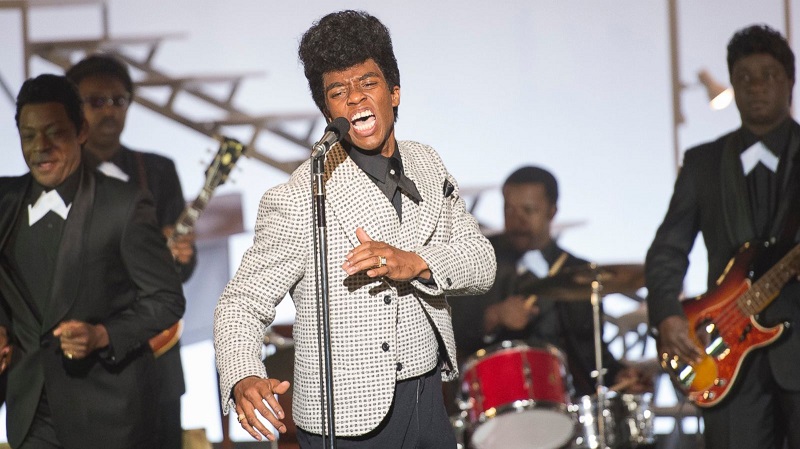
Get On Up arrived in 2014 and featured the thespian delivering his second powerful encapsulation of an African American legend in a row. Some may have shied away from doing another biopic, but not Boseman. Some may have hesitated to tackle a character like Brown that was so well known by so many it may have seemed difficult to get a fair shake from critics and audiences who have their own ideas of who Brown was and what he stood for throughout his life. Not Boseman. He dove in and captured the Say it Loud-I’m Black and I’m Proud singer in ways that not only humanized him to hundreds of millions but also showcased the power he had in influencing lives and helping foster societal change.
Too often biopics of musicians serve as literal and figurative greatest hits of life accomplishments. That’s fine, but Boseman’s professional mission of bringing characters to the screen who have the power to impact or create change for the better could not have been better “showcased” with his work on Get On Up. The actor gave us a James Brown who was otherworldly talented, a musician that moved the needle on popular music, soul, and R&B, but also possessed faults that also firmly defined him.
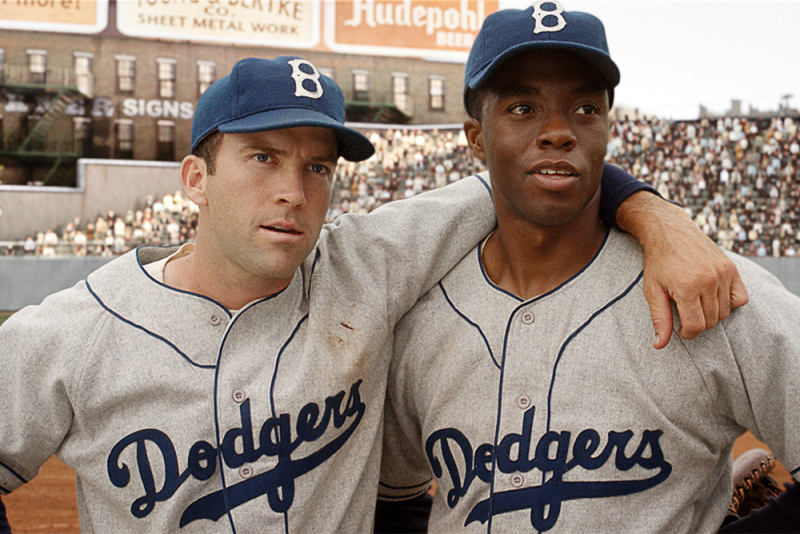
After the release of Get On Up, Boseman became seen by the wider movie-going public as an individual whose name alone put people in theaters. He was an actor whose process of characterization went beyond what so many others achieve. We were on the receiving end of something exceptional, a once-in-a-lifetime gift in the form of a South Carolina born, Howard educated and Oxford-trained (thanks to Denzel Washington’s anonymous donation… look it up, truly moving) actor whose tackling of the craft was nothing short of a triumph.
After giving us Jackie Robinson and James Brown, Boseman achieved a titanic trifecta of African American 20th century legends with his work on the title role of Marshall. Many might have said, “I better not push it, I’ve done well so far with Brown and Robinson, why undertake someone as enormous to not only the black community but the law-abiding, socially conscious world at large like Thurgood Marshall?” Not Boseman, he ran towards that challenge and gave us an Associate Supreme Court Justice who simultaneously broke barriers and helped enact true actionable change for not only his people but all peoples.
The 2017 film was a slice of life performance as it looked at one of the lawyer’s major cases that helped shape him and was not a career-spanning biopic. Again, Boseman had chosen a project and a role wisely. In the process crafted a three-dimensional, grounded cultural icon. The subject matter at the heart of the film said all it had to say about Marshall without going into the details of every single thing that the legal eagle accomplished in his long and decorated life.
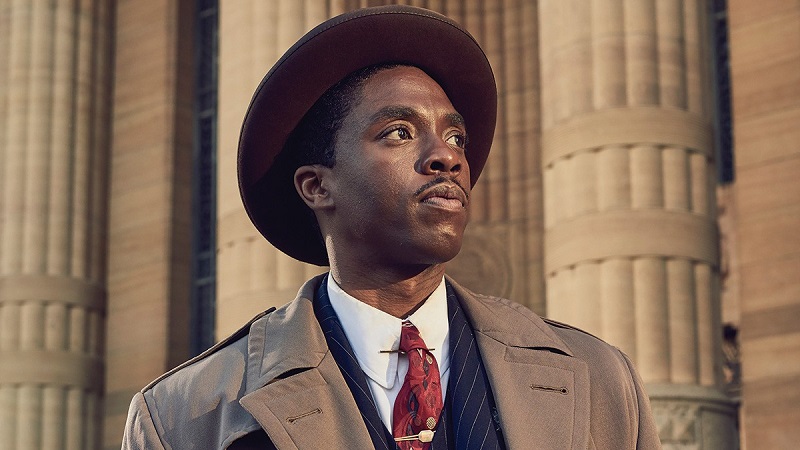
For anyone else, those three roles would be enough to feel comfortable being connected to exposing the lives of Robinson, Brown, and Marshall to the masses in the medium of film—one that lasts forever and reaches countless souls over time as folks discover these films as the years go by. Boseman achieved superstar status in the most historic of ways when he took on the part of T’Challa/Black Panther.
The world was first introduced to the African prince (and ultimate king) in 2016’s Captain America: Civil War. It was a match made in heaven and audiences couldn’t get enough of Boseman’s take on the first black superhero since Wesley Snipes donned those shades in Blade back in 1998. It’s good that people wanted more from T’Challa after Civil War because the actor would inhabit the “Wakanda Forever” leader three more times—in 2018’s Black Panther, that same year also gave us Avengers: Infinity War and then 2019’s Avengers: Endgame. It was the latter that found audiences cheering and leaping out of their seats in joy when it was T’Challa who first emerged from that time portal during the final battle with Thanos (Josh Brolin) in Endgame.
That was, of course, earned due to the explosive impact that Black Panther had when it gave the globe its first international black superhero. He was African! The fact that Wakanda was a paradise, a model for the world who had to keep itself hidden for fear of exploitation, and his lineage was behind leading that country, further showed the power and promise of black people and their ability and opportunity to change the world.
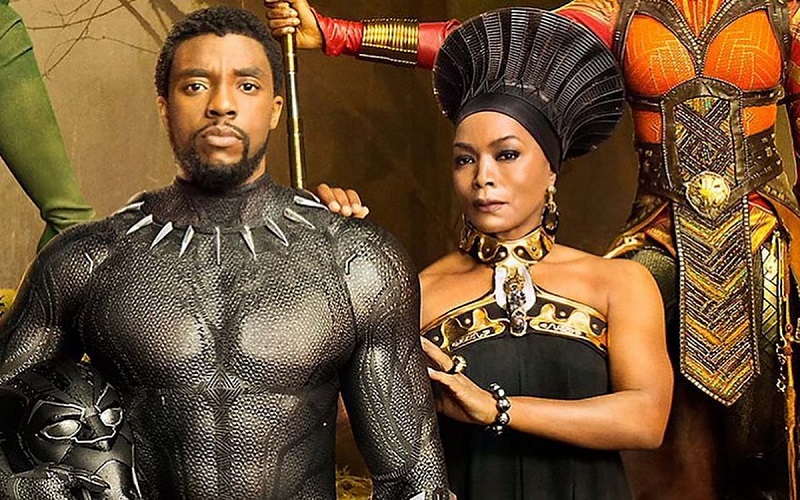
Black Panther broke box office records (it banked over $1.3 billion) and smashed down walls that had kept superhero movies from being honored outside the landscape of who already adores them—such as Guy’s Choice Awards or MTV Movie Awards. Boseman’s solo superhero movie was nominated for seven Oscars, including Best Picture, and won three. It became a cultural sensation that transcended race, creed, color, geography, language… everything!
Was it the subject matter, the character, or the man behind the role? One could argue it was all three, but it cannot be stated enough that the work that Boseman did to fully fill out this comic book based hero was otherworldly. There was a dignity to his turn, a quiet grace that gave way to a powerful roar when called for in the name of justice. It was just what we as a society needed and could explain one reason why millions the planet over would utter “Wakanda Forever” by the time the film’s run had concluded.
What is the most astounding aspect of this story is how Boseman had been battling Colon Cancer since 2016, including multiple surgeries and chemo. Think about that. Despite being in severe pain, massive discomfort and viciously ill, he made Marshall, Black Panther, Avengers: Infinity War, Avengers: Endgame and 21 Bridges, Spike Lee’s Da 5 Bloods, and the upcoming Ma Rainey’s Black Bottom—all while sick. Not only that, but he promoted all these films with massive global publicity tours and visited with cancer fighters and terminal patients throughout those years. There’s even an incredibly touching video of him speaking about visiting with terminally ill cancer patients, while he was terminally ill. Such power. Such talent. Such range. A one-man institution.

